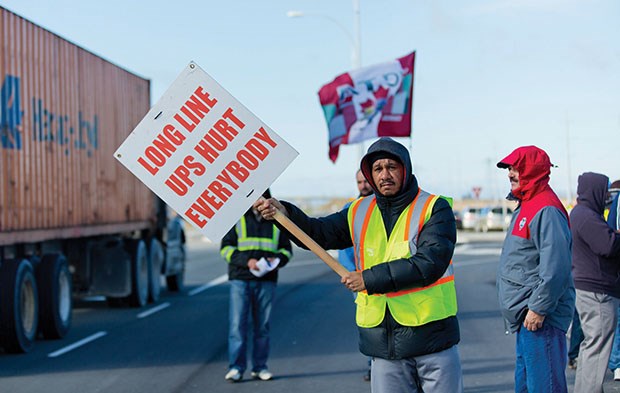Lower Mainland truckers were setting up picket lines at Port Metro Vancouver Monday morning after both union and non-union drivers overwhelmingly rejected a tentative agreement over the weekend.
On Saturday, more than 300 members of Unifor-Vancouver Container Truckers' Association (VCTA) voted unanimously to reject the deal, which came out of last Thursday's meeting with federally appointed mediator Vince Ready.
"Our members have spoken, the deal was too little, too late," said Paul Johal, president of Unifor-VCTA.
The unionized drivers are now joining the more than 1,000 non-union truckers, who began a work stoppage late last month.
On March 1, Unifor members voted unanimously in favour of a strike but delayed job action after Ready was brought in.
The non-union truckers, represented by the United Truckers Association, also voted to reject the deal.
The drivers are protesting a number of issues, including long wait times and low pay rates at Port Metro Vancouver ports, including Deltaport.
The union's collective agreement expired in June 2012. Since that time, the union has raised concerns that long line-ups and wait times at the Port of Vancouver are costing truck drivers. Unifor-VCTA is demanding increased rates of pay and wants the rates standardized and enforced across the sector to put an end to under-cutting.
"We've warned the government for years how bad the conditions are," said Gavin McGarrigle, Unifor's B.C. area director. "We welcome the involvement of Vince Ready, but the feedback I've gotten is that our members need to see something far more immediate to improve their economic position."
The work stoppage has already started to affect operations at the ports with shipments destined for the Lower Mainland diverted to other West Coast terminals. Port Metro Vancouver is currently seeing only about 10 per cent of the usual container truck traffic accessing its terminals.
Peter Xotta, vicepresident of planning and operations for PMV, said major retailers have begun to execute their diversion plans to other ports. He did not know how much cargo would be diverted, but speculated it would likely be sent to ports in Seattle or Tacoma.
Port Metro Vancouver said local trucking moves about 1.3 million TEUs (20-foot equivalent units) of containers per year and that based on the 2011 economic impact study figures, the value of those goods would be approximately $46 billion per year, or $885 million worth of cargo moved by truck weekly.
"The impact of truckers walking off the job is in the order of about $885 million per week," said Robin Silvester, Port Metro Vancouver president and CEO. "Goods are not moving and that is bad news for consumers and businesses."
While traffic at PMV ports is dwindling during the work stoppage, the port authority is taking steps to enhance safety for working truckers.
Last week, Port Metro Vancouver obtained a court injunction to prevent protestors from setting up on port property after reports of threats, intimidation and vandalism.



